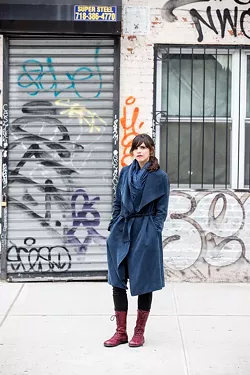Political disquiet | Literature | Rochester City Newspaper
We stay in a time when so many of us are fatigued by the information. We get worried that we can’t donate to all of the triggers that beg for our notice. It is gotten to the point when, right here in 2020, many of us really feel emotionally anesthetized. Both of those sides of the terrific divide present by themselves with didacticism in our films, music, and publications. And in this indefatigable disquiet, we are exhausted.
To some, this provides a dilemma for the arts. But if artwork and literature explain to us about the human problem, and if the unique as very well as the collective practical experience are valued as integral to no cost expression, then we must remind ourselves that even though the information must not be enjoyment, our enjoyment can nonetheless inform.
Very long-debated by the historical Greeks is the marriage concerning fact, neighborhood, and aesthetics, and that discussion continues to be unresolved. This week, the College of Rochester’s Humanities Centre General public Lecture Collection examines the themes of neighborhood, morality, and recent events with acclaimed author Valeria Luiselli.
In 2015 Coffee Home Press posted Luiselli’s “The Story of My Tooth.” Instead swiftly, it was very acclaimed and was nominated for both equally the National Ebook Critics Circle Award and the Finest Translated Ebook Award. Luiselli won the 2015 Los Angeles Situations Prize for Finest Fiction. The novel was compared to Kafka and Borges — no question two significant influences on her writing. All those who follow intercontinental literature and compact presses like Coffee Home understood Luiselli, at 33-a long time-old, was about to get massive.
Luiselli is a Mexican-born author who was elevated all above the environment. She has volunteered as an interpreter in the courts for asylum-looking for little ones at the American border. In her many months volunteering, none of the little ones she aided uncover pro bono attorneys have been granted permission to keep on being in the United States. Luiselli witnessed to start with-hand the devastation, fear, and trauma of innumerable displaced little ones. Working with her literary system as a driving power, she went on to create “Tell Me How It Ends: An Essay in Forty Questions” (hailed by some of indie literature’s greatest, including Mark Haber from Brazos Bookstore and Stephen Sparks at Point Reyes Guides). The title of the e-book references the forty queries thrown at unaccompanied baby migrants on the consumption questionnaire.
Luiselli’s third novel, “The Misplaced Youngsters Archive,” is the to start with she has written in English. This was intended to be her “rage” novel — the 1 that, in its earliest drafts, was meant to expose her righteous indignation aimed at a method that fails the most vulnerable. She portrays the United States Immigration and Customs Enforcement (ICE) as a form of extremism, violence, and psychological torture. But as an alternative of a proverbial fist-shaking that would incite a shared resentment in her viewers, “The Misplaced Youngsters Archive” is a story of grief and inhumanity, imbued with a equivalent humor and absurdity that visitors liked in “The Story of My Tooth.” It is in the literary milieu of Kafka and Borges, and meant to make American visitors snicker and increase an eyebrow as very well as lament and learn a point or two about their have govt.
A literary collage and highway journey novel, “The Misplaced Youngsters Archive” renders a pathos that all those fatigued by recent events can digest — and it’s the novel Luiselli will be discussing at the College of Rochester this Thursday.
The General public Lecture Collection was launched in 2015 and this tutorial 12 months it’s committed to the concept of communities. At this celebration Luiselli will be in dialogue with Ruben Flores, associate professor of history at the College of Rochester. Flores’s space of target is on U.S.-Mexican relations, and his e-book, “Backroads Pragmatists: Mexico’s Melting Pot and Civil Legal rights in the United States” (College of Pennsylvania Press, 2014), is a telling of the rebuilding of Mexico after the Mexican Revolution.
“Valeria Luiselli’s fantastically crafted explorations of displacement and belonging built us identified to include her voice to our 12 months-long dialogue on our concept of communities,” Humanities Centre Director Joan Shelley Rubin explained to Metropolis in a cellular phone interview. “We are delighted that she will empower the Rochester-space public, as very well as College of Rochester students, school, and workers, to feel with each other about migration, family members, and borders in new strategies.”
The University’s Humanities Centre has also structured events special to students. Previous the public celebration on Thursday, somewhere around 20 students (largely sophomores) and five school users read through and discussed “The Misplaced Youngsters Archive” with each other as portion of an experimental Humanities Examining Colloquium. The students will have an option to meet up with Luiselli on Thursday afternoon in advance of the public lecture.
Rachel Crawford is a freelance writer for Metropolis. Responses on this short article can be directed to [email protected].

